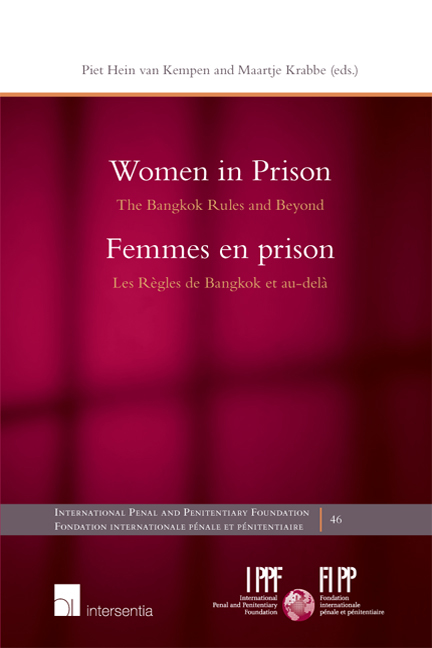Book contents
- Frontmatter
- Foreword
- Avant-propos
- Acknowledgements
- Remerciements
- Contents
- Part I Introductory Synthesis and Analyses: 1ÈRE Partie Synthèse ET Analyses Introductives
- Part II Themes: 2ÈME Partie Thèmes
- Part III National Reports: 3ÈME Partie Rapports Nationaux
- Women in prison in Argentina
- Women in prison in Australia
- Women in prison in Austria
- Women in prison in Brazil
- Women in prison in England and Wales
- Women in prison in Finland
- Femmes en prison en France
- Women in prison in Germany
- Women in prison in Greece
- Women in prison in Ireland
- Femmes en prison en Italie
- Women in prison in the Netherlands
- Women in prison in New Zealand
- Women in prison in Poland
- Women in prison in Portugal
- Women in prison in Russia
- Women in prison in South Africa
- Women in prison in Spain: their criminological and social invisibility
- Femmes en prison en Suisse: la situation des femmes prévenues et condamnées
- Women in prison in Taiwan
- Women in prison in Thailand: implementation of the UN Bangkok Rules in the Thai criminal justice system
- Femmes en prison en Turquie
- Women in prison in the USA
- Appendix The Bangkok Rules: Annexe Règles De Bangkok
- The International Penal and Penitentiary Foundation: History and Purpose
Women in prison in South Africa
from Part III - National Reports: 3ÈME Partie Rapports Nationaux
Published online by Cambridge University Press: 25 September 2018
- Frontmatter
- Foreword
- Avant-propos
- Acknowledgements
- Remerciements
- Contents
- Part I Introductory Synthesis and Analyses: 1ÈRE Partie Synthèse ET Analyses Introductives
- Part II Themes: 2ÈME Partie Thèmes
- Part III National Reports: 3ÈME Partie Rapports Nationaux
- Women in prison in Argentina
- Women in prison in Australia
- Women in prison in Austria
- Women in prison in Brazil
- Women in prison in England and Wales
- Women in prison in Finland
- Femmes en prison en France
- Women in prison in Germany
- Women in prison in Greece
- Women in prison in Ireland
- Femmes en prison en Italie
- Women in prison in the Netherlands
- Women in prison in New Zealand
- Women in prison in Poland
- Women in prison in Portugal
- Women in prison in Russia
- Women in prison in South Africa
- Women in prison in Spain: their criminological and social invisibility
- Femmes en prison en Suisse: la situation des femmes prévenues et condamnées
- Women in prison in Taiwan
- Women in prison in Thailand: implementation of the UN Bangkok Rules in the Thai criminal justice system
- Femmes en prison en Turquie
- Women in prison in the USA
- Appendix The Bangkok Rules: Annexe Règles De Bangkok
- The International Penal and Penitentiary Foundation: History and Purpose
Summary
INTRODUCTION
In 2001, South Africa prisons and sentencing expert van Zyl Smit observed that “there has been no systematic study of the imprisonment of women in South Africa or of the regime to which they are subject”. Over a decade later, South African researchers produced just three key contemporary empirical studies that explore the lives and experiences of incarcerated women. None of these specifically focuses on the systematic collection of comprehensive demographic data or the conditions in women's prisons, nor are they nationwide in their scope. The availability of women in prisons data and research on the rest of the African continent does not fare much better. The limitations of accessible and accurate biographical and demographic data on the South African prison population, however, do not only pertain to female prisoners. While the South African prison system is known to take relatively detailed admissions and health data once a prisoner enters the system (cf. registration of inmates, Rule 4 of the Bangkok Rules and the White Paper on Correctional Services), the collation, analysis and dissemination of detailed offender data do not get presented in the annual reports of the Department of Correctional Services (DCS). Despite commitments set out in the DCS White Paper - “the principal strategic document aimed at directing the management and service provision of the department” and the official policy frameworkfor the operations of DCS - to create a national offender population profile system, prisoner demographics are still inadequately presented in key annual and strategic reports of the Department.
What we do know from official DCS reports is that there are currently 243 correctional services facilities in South Africa. Eight of these are “female-only” facilities and 129 are for men only. Ninety-one (91) facilities have separate sections for female offenders, where women are housed separately from men, something which is required by law. The latest data released by the DCS (2014) show that there are currently 157,170 people in custody, of whom 113,458 have been sentenced and 43,712 are remand detainees. The International Centre for Prison Studies (ICPS) estimates that the official capacity of the prison system is 119,890, meaning that the occupation level of South African prisons is currently 129% over-capacitated. The proportion of sentenced prisoners serving 10 years and more is 48%.
- Type
- Chapter
- Information
- Women in PrisonThe Bangkok Rules and Beyond, pp. 663 - 696Publisher: IntersentiaPrint publication year: 2017
- 1
- Cited by



